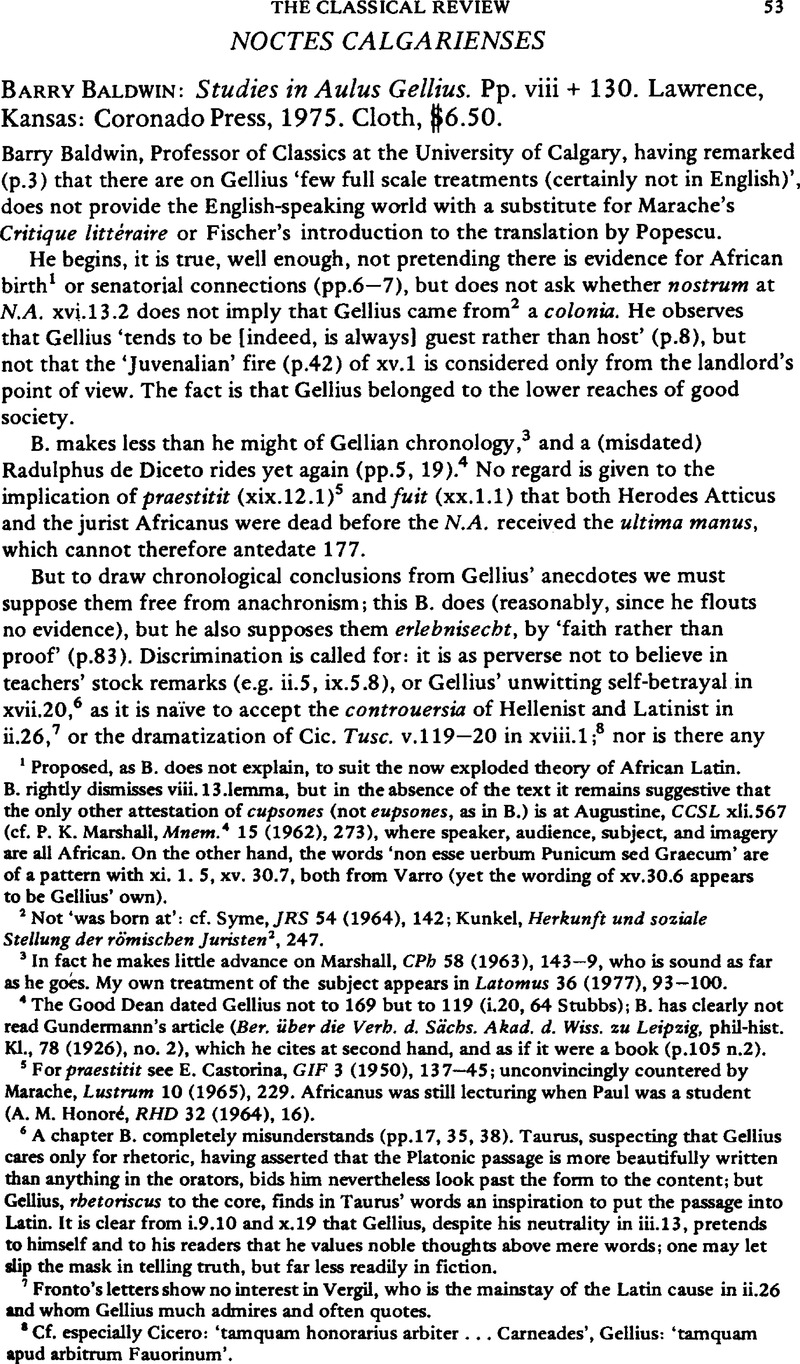No CrossRef data available.
Article contents
Noctes Calgarienses - Barry Baldwin: Studies in Aulus Gellius. Pp. viii + 130. Lawrence, Kansas: Coronado Press, 1975. Cloth, $6.50.
Published online by Cambridge University Press: 27 February 2009
Abstract

- Type
- Reviews
- Information
- Copyright
- Copyright © The Classical Association 1978
References
1 Proposed, as B. does not explain, to suit the now exploded theory of African Latin. B. rightly dismisses viii. 13. lemma, but in the absence of the text it remains suggestive that the only other attestation of cupsones (not eupsones, as in B.) is at Augustine, CCSL xli.567 (cf. Marshall, P. K., Mnem.4 15 (1962), 273Google Scholar), where speaker, audience, subject, and imagery are all African. On the other hand, the words ‘non esse uerbum Punicum sed Graecum’ are of a pattern with xi. 1. 5, xv. 30.7, both from Varro (yet the wording of xv.30.6 appears to be Gellius' own).
2 Not ‘was born at’: cf. Syme, , JRS 54 (1964), 142Google Scholar; Kunkel, , Herkunft und soziale Stellung der römischen Juristen 2, 247.Google Scholar
3 In fact he makes little advance on Marshall, CPh 58 (1963), 143–9, who is sound as far as he goes. My own treatment of the subject appears in Latomus 36 (1977), 93–100.
4 The Good Dean dated Gellius not to 169 but to 119 (i.20, 64 Stubbs); B. has clearly not read Gundermann's article (Ber. über die Verh. d. Sächs. Akad. d. Wiss. zu Leipzig, phil-hist. Kl., 78 (1926), no. 2Google Scholar), which he cites at second hand, and as if it were a book (p.105 n.2).
5 For praestitit see Castorina, E., GIF 3 (1950), 137–145Google Scholar; unconvincingly countered by Marache, , Lustrum 10 (1965), 229Google Scholar. Africanus was still lecturing when Paul was a student (Honoré, A. M., RHD 32 (1964), 16Google Scholar).
6 A chapter B. completely misunderstands (pp.17, 35, 38). Taurus, suspecting that Gellius cares only for rhetoric, having asserted that the Platonic passage is more beautifully written man anything in the orators, bids him nevertheless look past the form to the content; but Gellius, rhetoriscus to the core, finds in Taurus' words an inspiration to put the passage into Latin. It is clear from i.9.10 and x.19 that Gellius, despite his neutrality in iii.13, pretends to himself and to his readers that he values noble thoughts above mere words; one may let slip the mask in telling truth, but far less readily in fiction.
7 Fronto's letters show no interest in Vergil, who is the mainstay of the Latin cause in ii.26 and whom Gellius much admires and often quotes.
8 Cf. especially Cicero: ‘tamquam honorarius arbiter … Carneades’, Gellius: ‘tamquam apud arbitrum Fauorinum’.
9 Cf. Berthold, H., Aulus Gellius: Auswahl und Aufgliederung seiner Themen (Diss. Leipzig, 1959), 59–60Google Scholar; Barigazzi, , Gnomon 42 (1970), 682.Google Scholar
10 According to contemporaries Favorinus was a eunuch, not a hermaphrodite: Polemo, Physiog. i.161.8 ff. Förster (ἄνορχος from birth); Lucian, , Demonax 12Google Scholar.
11 The argument is not decisive, but rests on a principle expressed by Mercklin in his classic discussion of Gellius' ‘Citiermethode’ (JbClPh, Supp. 3 (1857–60), 635–709, which B. not once mentions. On the two passages see Schröter, R., AAWM (1959), 859.Google Scholar
12 This was shown in 1851 by Dirksen (Abh. d. K. Akad. d. Wiss. zu Berlin, phil. u. hist. Abh., 45–50). B. does not even refer his readers to the repertory of attributions in Hosius's preface, nor to the sensible remarks of Wissowa, G., GGA 169 (1907), 734 ff.Google Scholar
13 As both contexts make clear, it means ‘trite’.
14 B. wrongly follows Haines in taking ‘Veteris eloquentiae colorem adumbratum ostendit Hadriana oratio’ (p.l 18.29 v.d.H.) as disdainful, but adumbrare need not be pejorative: Hadrian's style gave a hint of ancient eloquence (cf. Cic. de or. iii. 16). Nor is de orationibus 2 a sneer at Hadrian through the title of his poems: Fronto does not want Marcus to enfeeble his Catonian style with grafts from Seneca ‘catachannae ritu’, a phrase explained by Marcus himself (ep. ii.6) ‘in uno trunco omnia omnium feme germina’.
15 Cf. n.7 above. Note the Vergil-citation at xii.1.20, which cannot come from Favorinus' speech in Greek (§24) but attests to Gellius' own love for the poet.
16 Cf. my article ‘Elocutio nouella’, CQ 17 N.S. (1976), 140–141Google Scholar.
17 Having come to this conclusion in my unpublished D.Phil, thesis ‘A Select Commentary on Aulus Gellius Book 2’ (Oxford, 1971), 82–84Google Scholar, I found it confirmed by Goold, G. P., HSCP 74 (1970), 161–162Google Scholar, and J. E. G. Zetzel, ibid. 77 (1973), 225–43.
18 See Housman on Man. i.539, iv.472, 644, Lucan i.102, and add Sen. H.F. 680–3. The two Vergilian passages also illustrate the poet's trick of assigning two verbs in conjunction to one subject and modifying the second with an adjectivally qualified ablative (cf. Aen. iv.2). The argument in § 7 from amaror at Lucr. iv.224 may be met by Lucr. ii.401 (cf. Macr. Sat. vi.1.47).
19 If B. wished to play the prosopographer, he should have observed that Gellius' friend Julius Celsinus may have become a consul and is likely to have been the father-in-law of one (PIR 2 i.255).
20 For the contrast see xvi.10.7–8. The law on furtum stated in xi.18 is taken from Sabinus, whose views were in Gellius' day disputed (G. iii.185) or rejected outright (G. ii.51). The great contemporary jurists pass Gellius by: we meet only Africanus, and him but once, and then expounding the Twelve Tables (xx.l).
21 Besides, the landlubberly, villa-dwelling Roman reader would surely have been less interested in the σπ⋯ρτα of the Achaeans' ships (xvii.3) than in the λα⋯ρη of Odysseus' palace even did he not need reassuring it was not the lavatory.
22 ‘Quis est enim qui totum diem iaculans non aliquando conliniet?’ Cic. Div. ii.121.




